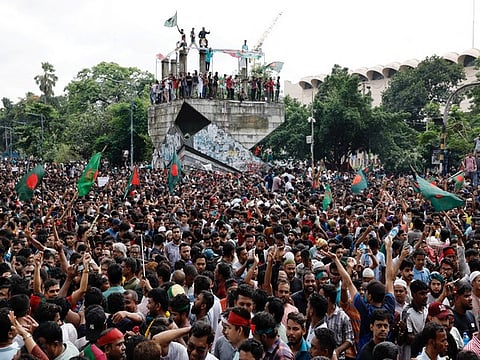

Bangladesh Prime Minister Sheikh Hasina has resigned amid massive protests that erupted last month over a contentious job quota today, Monday, August 5.
Today, millions of demonstrators took to the streets of Dhaka, marching towards Shahbag and defying an indefinite curfew imposed following violent clashes that claimed over 90 lives yesterday. As the unrest grew, the call for PM Sheikh Hasina’s resignation intensified, culminating in her stepping down and fleeing the country.
“We have won — what a month it has been, but finally we have won,” said Madhurjo (name changed), a student of Jahangirnagar University. “Everything was halted — internet, public gathering — to suppress the success of the protest, but we stayed connected through personal peer-to-peer channels.”
Sheikh Hasina left Bangabhaban, her official residence, on a military helicopter for a "safer place", accompanied by her younger sister, Sheikh Rehana, according to media reports. Following her departure, protesters stormed her palace, seizing items including chairs, tables, food, and even pets.
“I am still in disbelief,” said Fatima (name changed). “This is a moment of celebration, and everyone is celebrating. The seizure of the Gonobhaban (PM’s Palace) is not looting but reclaiming what rightfully belongs to the people.”
However, Fatima expressed concerns about the potential for violence and exploitation of the situation. “There have been reports of arson. We must be cautious and ensure the safety of minorities amid this power shift.”
The protests, initially focused on reforming the discriminatory quota system for government job recruitment, evolved into a broader movement against what many see as an authoritarian regime.
The unrest began in July following a High Court order reinstating the abolished quota for descendants of freedom fighters in civil service jobs. Hundreds of protesters, most of them students, were killed, fueling public outrage and demands for change.
While the interim government has been set up in the wake of Hasina's resignation, students are not yet certain about what is to come. “We are yet to understand the situation, which is quite abstract at the moment,” said Nusrat from East West University, Bangladesh.
The students say they aren’t very pleased with the Army General's statements and insist on having representation in deciding the nation's future. “This is a new beginning. We are hopeful and believe our generation must be part of the nation-building process,” said Fatima.
Students have maintained their political neutrality, emphasising that their opposition to the Awami League Party does not equate to support for the Bangladesh Nationalist Party (BNP) or Jamaat-e-Islami Bangladesh.
“BNP and Jamaat should not think they can take advantage of the situation. We are vigilant against any attempts to hijack this movement or persecute minorities,” Fatima added. “We hope a democratic front will emerge from this.”
How the quota came to be
To recall, the freedom fighters, known as the Mukti Bahini, who fought the Pakistani army and the Razakars (collaborators with Pakistani forces) during the Bangladesh Liberation Movement in 1971, were hailed as heroes.
Sheikh Mujibur Rahman, the first Prime Minister of independent Bangladesh, established a 30% quota for these freedom fighters, which was later extended to their children and grandchildren.
Critics have long argued that this law, intended to honour their sacrifice, had become a partisan tool favouring pro-government factions in civil service appointments. With rising unemployment, the controversial law felt increasingly unjust to many.
The government's crackdown on the protests has been severe, with numerous reports of police brutality and mass arrests.
Despite the Supreme Court reducing the veterans' quota to 5%, with 93% of jobs now to be filled based on merit and the remaining 2% reserved for ethnic minorities, transgender individuals, and people with disabilities, the protesters remained unsatisfied. They demanded the resignation of Sheikh Hasina and her cabinet.
Today, August 5, stands as a day of great victory for all who fought for change, including students.
